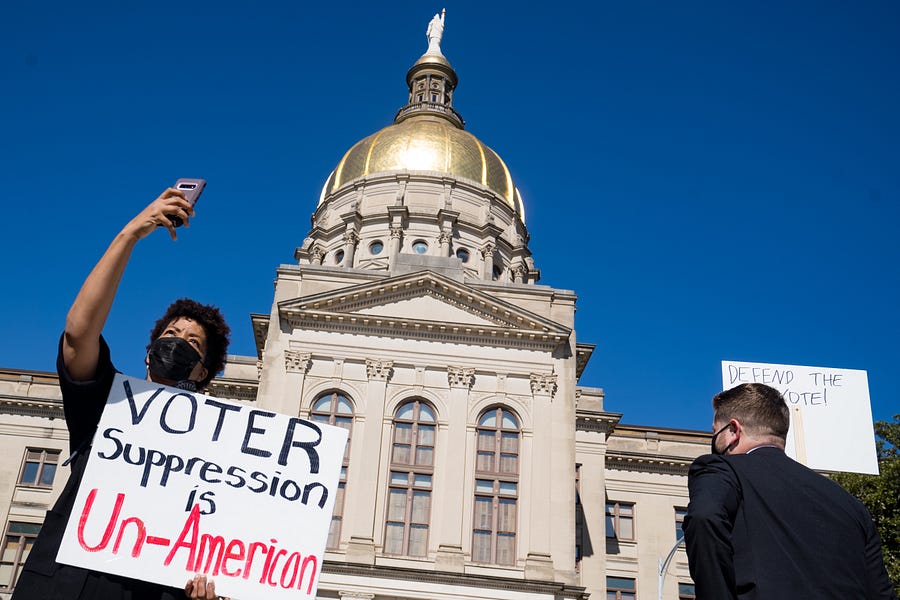The Georgia debacle is a perfect example of the rolling collective action problem of our democracy. A collective action problem, simply put, is when there is a goal that would benefit everyone—in this case, confidence in our machinery of democracy—but the incentive structure for the individual players makes it impossible to cooperate to reach the goal.
The Georgia electoral mess goes back to the 2018 Georgia governor’s race—and every faction in that state has made it worse over the last three years.
Former state Rep. Stacey Abrams ran for governor against then-Secretary of State Brian Kemp, who oversaw the legal but aggressive updating—critics say “purging”—of the voter rolls. Abrams claimed this was a racist attempt to disenfranchise black voters.
When Abrams lost, she refused to formally concede, claiming Kemp had won the election because of “voter suppression.” The charge is almost surely false. It was a huge turnout year, including among black voters. Even if all of Abrams’ specific claims were true, most experts think it wouldn’t have come close to overcoming her losing margin of 55,000 votes. But her claim became gospel among Democrats and liberal pundits.
In 2020, Georgia—run by Republicans—carried out COVID-safe electoral measures, including easier absentee and early voting. In the lead-up to the election, former President Donald Trump repeatedly let it be known that if he lost, he would blame such measures as evidence of widespread “fraud.”
He was true to his word. He convinced large numbers of Republicans and right-wing media commentators that the election was stolen. This has come to be known as “the big lie.”
Georgia was ground zero for the big lie, in part because Trump, and the GOP generally, believe the state is their rightful domain, even though it has been trending “purple” for a long time. Kemp, now governor, and Georgia Secretary of State Brad Raffensperger were singled out as traitors who were in on “the steal.” This buffoonery undoubtedly cost the GOP two runoff U.S. Senate races and Senate control.
With the pandemic fading, Georgia Republicans moved to update their election laws. Because so many Republican officials needed to get right with their voters who still believe the big lie, the legislature toyed with some bad ideas—like actually getting rid of no-excuse absentee voting entirely—that never made it into the bill. However, it did pass a troubling measure that allows the appointed and Republican-controlled state election board to overrule local election officials when it deems it necessary.
Overall, though, the state’s Election Integrity Act of 2021 is far more modest than its detractors claim. Its rules on absentee and early voting are more generous than many Democrat-controlled states, including President Biden’s home state of Delaware. The new law is hardly immune to criticism, but it’s certainly not “Jim Crow in the 21st century,” as Biden called it.
But none of this matters. First, both political parties seem to have forgotten that there was a pandemic requiring reasonable changes from the norm. The Trumpists want to pretend none of that was really necessary—or even the point. They claim it was all done to steal the election. Democrats want to pretend that those extraordinary pandemic measures were ordinary and any attempt to roll them back even a little amounts to a Republican effort to steal future elections.
But the real problem is the incentive structure. Democrats are eagerly pushing the Jim Crow narrative, in part because many believe it to be true, but also because it’s useful for turning out their base. Republicans, meanwhile, cling to Trump’s stolen election lie because he remains popular with their base. And much of the media just follows along.
This political situation is the opposite of the “bootleggers and Baptists” incentive model at work. In the early 20th century, bootleggers supported Baptist prohibitions against selling booze on Sundays because that policy drove up demand and prices for their product. Though the two groups had divergent moral views, they had parallel pragmatic interests.
The 2020 election was hugely successful by any conventional metric. There was precious little fraud, and more people voted than ever before. But Democrats can’t let go of the idea that their voters, especially their black voters, are being suppressed, and Republicans can’t let go of the idea that the election was stolen. And when either side acts on these assumptions, legislatively or simply rhetorically, it confirms the darkest suspicions of the other side and undermines faith in the machinery of democracy even more.







Please note that we at The Dispatch hold ourselves, our work, and our commenters to a higher standard than other places on the internet. We welcome comments that foster genuine debate or discussion—including comments critical of us or our work—but responses that include ad hominem attacks on fellow Dispatch members or are intended to stoke fear and anger may be moderated.
With your membership, you only have the ability to comment on The Morning Dispatch articles. Consider upgrading to join the conversation everywhere.